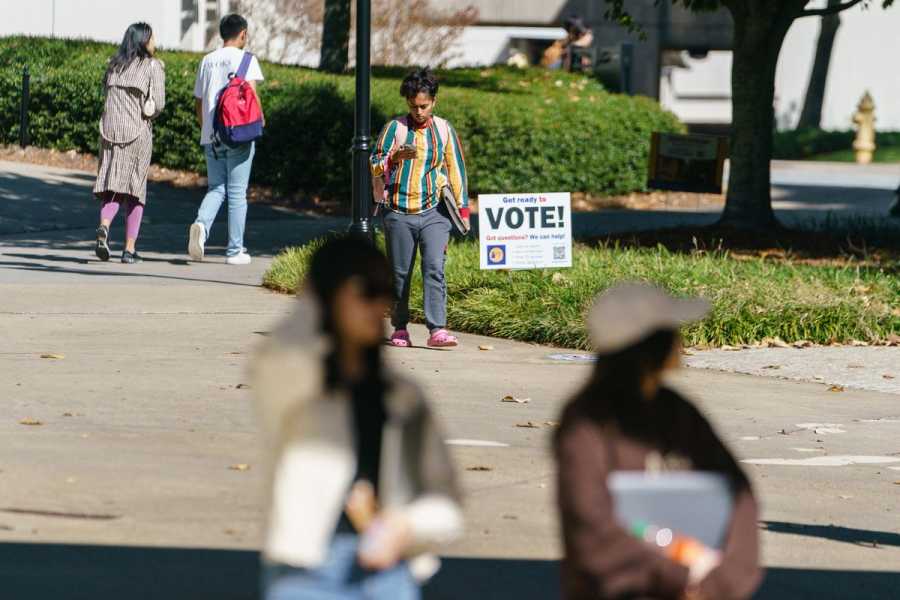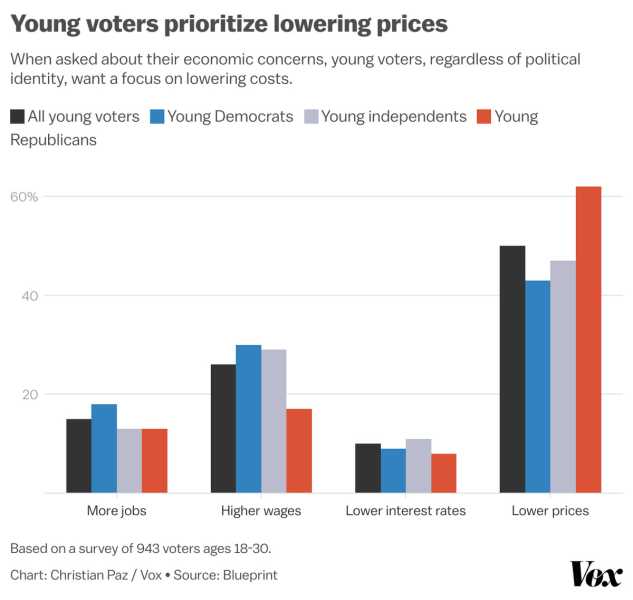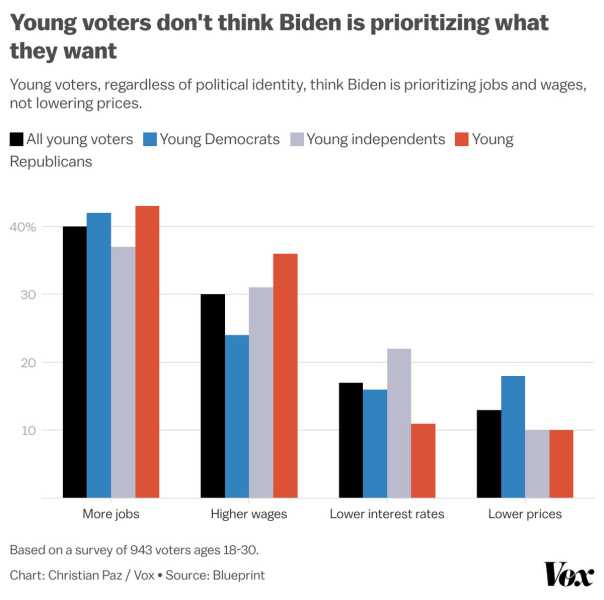It’s not what you think.

Young people pass a voting information sign on the campus of Emory University in Atlanta, Georgia, in October 2022. Elijah Nouvelage/AFP Christian Paz is a senior politics reporter at Vox, where he covers the Democratic Party. He joined Vox in 2022 after reporting on national and international politics for the Atlantic’s politics, global, and ideas teams, including the role of Latino voters in the 2020 election.
Long before the Israel-Hamas war broke out, young Americans were already souring on President Joe Biden. That discontent has only picked up in the last few months — registering in polls as increased support for Donald Trump and third-party candidates, and defections from the president, but not necessarily from his party.
The reasons for why this is happening have become one of the defining questions of the 2024 election so far. But what if this horse race is missing the point?
A new poll of young voters shared exclusively with Vox provides an important corrective: Young voters aren’t all that mystical; they’re a lot like the average American, concerned first and foremost with the state of the economy.
“People tend to have a skewed perception of what young voters prioritize,” Evan Roth Smith, the lead pollster for the Democratic-aligned public opinion research group Blueprint, which conducted this polling, told me. “A large part of that is because there are ways politically that young voters are very different and very distinct in what they care about. But the places that they’re different shouldn’t be confused with the places that they care the most about.”
This tracks with what my election reporting has turned up this year: Economic and affordability issues are far and away the top concern for all young voters in Blueprint’s latest poll. Progressive priorities, like climate change, student loans, and even the Israel-Palestine conflict, rank far below kitchen table issues.
Notably, the poll does not ask about a match-up between Biden and Trump, or about 2024 vote preferences. Those horse-race topics are the primary way that public debates and the discourse around young voters have been conducted this year, leading to foundational and epistemic questions over how much we can trust polling and whether we’re reading too much into the crosstabs or methodology of polls.
So what does this poll tell us? A lot. Here are the top four takeaways.
It’s the economy — and health care
Blueprint surveyed 943 registered voters between the ages of 18 and 30, recruited from an online panel from April 27 to April 29. The margin of error is 5.8 percentage points. Those participants were asked how important a variety of issues were to them, and able to choose multiple priorities.
vox-mark
Sign up for the newsletter Today, Explained
Thanks for signing up!
Check your inbox for a welcome email.
Email (required)
Oops. Something went wrong. Please enter a valid email and try again.
By submitting your email, you agree to our Terms and Privacy Notice. You can opt out at any time. This site is protected by reCAPTCHA and the Google Privacy Policy and Terms of Service apply. For more newsletters, check out our newsletters page. Subscribe
Across every kind of young voter asked — Democratic, independent, or Republican; Black or Latino or white; college-educated or not — some variation of an economic concern was a top electoral issue. As a whole, inflation and the economy were the most frequently prioritized issues, chosen by 73 percent and 70 percent of young voters, respectively.
Health care was the only rival issue — cited frequently by Democrats, Black and white voters, women, and those making more than $75,000 a year — and chosen 71 percent of the time by all young voters as a top priority.
The top priority for young voters is also the one where they trust Biden least
When young people talk about the economy, they overwhelmingly mean lowering prices on food, gas, and services — not creating more jobs, lowering interest rates, or even earning higher wages (though that’s the second most important thing).

That dynamic is nearly the inverse of the way the president has been talking about his economic record and about his plans for a second term. For most of his presidency and the campaign so far, he’s primarily talked about wage growth, cutting junk fees, and the historically low unemployment rate. And young voters see this: there’s a 37-point gap between how much they want Biden to prioritize lowering prices, and how much they think he is.

Trump, meanwhile, is seen as focusing on prices. And this is the crucial conclusion: Trump is trusted more than Biden on the single most important issue: 52 percent say they trust Trump over Biden to reduce prices.
“Young voters trust Joe Biden more than Donald Trump on just about everything — except lowering prices. That’s a real problem,” Roth Smith told me. “If your only bright spot is the one that matters, that’s something that worries me, as a Democrat.”
The issues we associate with young voters aren’t very salient
When talking about young voters today, it seems like most politicians and the journalists covering the nation seem to default to a handful of progressive priorities: climate change, student loan cancellation, identity politics, and the war in Gaza.
But at least according to this poll, those don’t tend to be the issues that young voters are prioritizing the most. Among the lowest-priority issues in this survey are LGBTQ issues, student loans (both chosen 38 percent of the time), while climate change, Israel and Palestine, democracy, and race relations were chosen just about half the time. And they don’t necessarily want Biden to make a major change on some of these topics.
A good chunk of young voters actually say that Biden is closer to their views on student loans (43 percent say this), and about 42 percent of independent voters say Biden is close to their views on abortion, student loans, and immigration and the border. Which leads us to…
Young voters are idiosyncratic; they aren’t the progressive saviors some people want them to be
As I’ve written before, the youth aren’t necessarily going to save us. “At a moment when people are sitting at home, watching campus protests or climate protests, and go ‘Wow, this new generation has totally different priorities,’ really, when you start to survey everyone, you find out that the kids are just like us,” Roth Smith said.
They are almost an even ideological mix of moderate, liberal, and conservative — something many other surveys have found — but many still think Trump is not moderate enough.
For example, while about half of young voters see Biden as liberal, 74 percent say that Trump is conservative. They are more divided over how much more liberal or more conservative Biden should become; 37 percent would prefer he move to the left, 31 percent would prefer he move to the right, and 32 percent prefer he stay where he is.
“The difference for Trump is just about everyone who wants him to move wants him to move left,” Roth Smith said. While 39 percent want him to stay where he is, 45 percent want him to be less conservative.
It’s possible to draw out one more conclusion from this state of play: though young voters are upset, these conditions and feelings about Trump don’t seem to point toward a massive shift of young Americans toward Trump. They do point to plenty of problems: the top concern for a second Biden term is that he would be too old to do the job, followed by continued price increases, and being too pro-Israel. The top Trump concerns are more personal: that he would cut funding for Social Security and Medicare and cut taxes for the rich but not the working and middle class.
All this suggests there are plenty of opportunities for Biden to shore up his support, for his campaign to improve its messaging and targeting of voters, and for direct attacks on Trump that go beyond “Dobbs and Democracy.”
But it would be a mistake to assume that young voters are drastically different creatures. We’re essentially normies. We’re just young.
This story originally appeared in Today, Explained, Vox’s flagship daily newsletter. Sign up here for future editions.
Sourse: vox.com






